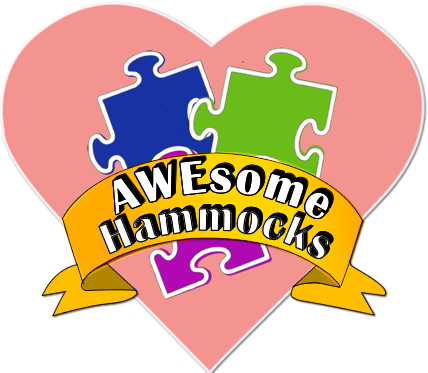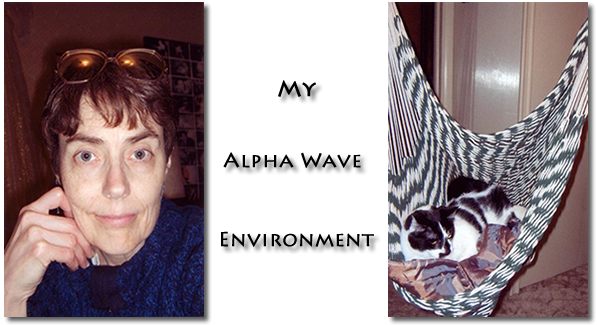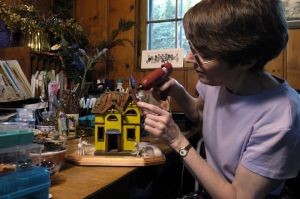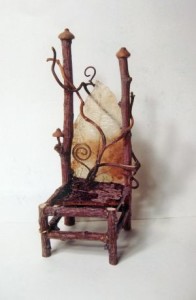In April of 2006, I was diagnosed with Asperger’s syndrome at 54 years old. I hope that my Corner will enlighten, inspire and delight all readers intrested in learning more about Asperger’s syndrome.
Idaho Health Magazine 2007
By Colleen LaMay
Boisean Marilyn Cosho, 56, lives happily alone with her three cats in a rental house on her mother’s property. She likes her day job teaching English to immigran and refugee children in the Boise School District, but she has passionate hobbies and interests, too, and her latest is creating miniature fairy houses and fairy twig chairs.
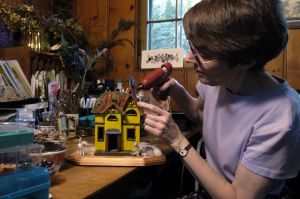
One of Marilyn Cosho’s hobbies is making miniatures.Above, she works on a tiny house at her home in Boise.
Photo by Brad Talbutt / Idaho Statesman
The pieces have a definite “wow” factor. Decorated with tiny animals and furniture, they are fun and often extremely detailed. My 11-year-old daughter, Kuranda, was entranced, but then, so was I, and I’m 47. They appeal to the kid in all of us. Cosho has created more than 300 of the intricate chairs. Each is about 5 inches tall and is made of small sticks, leaves, moss, tiny ornaments and other decorations. Some take up to nine hours to complete. She sells them at Crone’s Cupboard and Edwards Greenhouses in Boise.

Her fairy twig chairs are extremely delicate, intricate — and beautiful.
Photo by Brad Talbutt / Idaho Statesman
This is Cosho’s 16th year in the Boise School District. She began as a special education assistant and now teaches immigrants and refugee students as a tutor in the English Language Learners, or ELL, program. She is a certified teacher of kindergarten through eighth grade, with endorsements in reading, history, German, music and art. She recently passed the state Intensive Behavior Intervention exam. She is the author of two children’s books, “The Suzuki Idea Book for Beginning Violin” and “Owls and Pussycats, Are They Alike?”
She played violin and later viola for 10 seasons with the Boise Philharmonic. She is, in her own words, an “extreme” fan of Glenn Gould, a Canadian pianist considered brilliant and eccentric. Cosho owns every recording of his that she can find, and she listens to Gould every day. “Music can transport me,” she said. She writes poetry and has created more than 50 collages. In hindsight, each collage represents one aspect of her inner search of what would ultimately be diagnosed as Asperger’s syndrome.
Through her more than five decades of life, Cosho never really fit in with other people, no matter how hard she tried. She was anxious and depressed. Help would find her, but she couldn’t see it coming. It would take 54 years, but a psychologist in the Treasure Valley eventually put a label on her life that she says fit: Asperger’s syndrome, a developmental disorder and a mild form of autism. This is Marilyn’s story.
By Marilyn Cosho as told to Colleen LaMay
I searched for years for the help that would free me to be my somewhat eccentric self. In the meantime, I managed to keep my head above water. My IQ is above average and yet everyday activities like figuring out school assignments, teachers’ expectations and making friends have been daunting since I was a child.
I wanted and needed to be perfect, but my only A’s in school were in orchestra, English and typing. I received mostly B’s, a handful of C’s and a sprinkling of D’s. My parents knew I was trying my best and never criticized me. But I was very critical of myself. Despite my parents’ support, I didn’t think I was good enough. By about age 12, I was sure my dreams of marriage, children and a self-supporting career were doomed to failure, but I never told anyone. As long as I was in school, I could hide and delay what I instinctively knew would be my fate — living alone.
Other teenagers — their words, behaviors and interests — made no sense to me. Each year, I felt more out of place. Entering junior high school, I felt more and more bewildered and alienated. I was not interested in the latest fashions or music. English composer Orlando Gibbons was sublime; the Rolling Stones, intolerable.
I felt like a 12-year-old kid on the inside long after my 50th birthday — a child always trying to figure out why the grownups acted the way they did. I grew out of the body of a child and joined the adults, but I wasn’t one of them. In college, I became increasingly obsessed with studying and earned straight A’s my final semester. My overall grade-point average was 3.5. Graduating was one of my proudest achievements.
I was successful, but there was too much I didn’t understand about the world and the people who glided through it effortlessly. I went to mental-health professionals for help, but I didn’t understand them, and they didn’t understand me. For a decade, I played violin and then viola in the Boise Philharmonic. At age 25, I married a musician I trusted would protect me. After 15 years, the marriage ended in divorce. I was devastated. I could not bear to listen to music for the next eight years. I doubt I will marry again. For four years after the divorce, I lived in a basement apartment in the house of my sister’s family. Then I moved into a small rental house at the back of my mother’s property.
Many people find moving stressful and exhausting. But this move disassembled my life. The timing was bad, through no fault of my family. I was working and going to school, and finding time to move my things became a huge obstacle. As I usually do when I feel overwhelmed, I methodically focused on the little things, very little things. I carefully organized all of my possessions, no matter how small. I folded sacks and stored them in the same direction. I sorted books by topic. I hunted down all the minutia of my life, categorized it and put it in its proper place, even if it took most of the night. Eventually, through a series of lucky coincidences, I made my way to Boise social worker Sara Hill. On a hunch, she sent me to Meridian psychologist Tyler Whitney, who diagnoses and treats disorders related to autism.
I cried tears of joy when Dr. Whitney diagnosed me. I remember the date: April 13, 2006. I was 54 years old and had worked harder than you can imagine finding a place for “me” in the often-mysterious world of human relationships. Now that I knew why I had to try so hard, I stopped trying so hard. All of the pieces of the puzzle finally fit together. I understood my past. Asperger’s syndrome can give people extra focus that sometimes leads to extraordinary accomplishments, but it also brings a measure of trouble to many. Whether Asperger’s syndrome holds people back or helps them is a subject of intense, sometimes emotionally charged debate on the Internet.
For me, there wasn’t much of a debate. For years, I lived with the constant guilt of failing to measure up. Now I have the luxury of accepting the good and the bad of the syndrome, as I guess we all have to accept the good and bad in ourselves, whether we are “Aspies” or “neurotypicals,” as the online message boards label us all. I live alone now, but I am rarely lonely and never bored. I started letting myself be me.
I spent time at my solitary hobbies, investing hours making tiny furniture fit for tiny fairies and listening to music, particularly Gould. He died in 1982 and is thought to have had Asperger’s syndrome, although he never was diagnosed with it. I learned of him while researching Asperger’s after my diagnosis. His recordings restored my deep love of music. I think I hear and feel music the way he once did.
Since childhood, music has provided an entrancing escape. I remember listening to an old, scratchy recording of Enrico Caruso singing “Pagliacci,” about a clown obliged to make people laugh in spite of a broken heart. Although I did not understand the words, sung in Italian, the music was beautiful, and tears streamed down my face. I was only 4 or 5 years old, an age when most kids love simple, rhyming songs that involve hand clapping and feet stomping. I listen to music when I have trouble in other areas of my life, like talking to people. I usually take what people say literally, which causes misunderstandings. At the end of the school summer break last year, an acquaintance asked, “How has your break been?” I had broken my wrist six months earlier and replied, “It was doing much better, thanks.”
Although I might have trouble making sense of people, I feel extremely close to animals. Author Temple Grandin, who labels herself as autistic, wrote a book called “Animals in Translation,” about her theory of why people on the autistic spectrum seem to have a special connection with animals. She theorizes that because neurons in the brain do not connect right, other parts of the brain become more specialized at perceiving details.
I am extremely sensitive to light, noise, touch/textures, smells and temperatures. I keep the shades closed at my house on sunny days. I don’t go outdoors much because the weather is too hot or too cold. I wear special earphones to cut down on outdoor noises. I wear special glasses that decrease glare from light. To me, it feels like life throws too much at my senses at one time. That’s one reason why people are so confusing. I miss the multitude of body and verbal cues that are competing with a constantly changing environment. Like other aspects of Asperger’s syndrome, this can be an advantage. For example, concentrating on one thing for several hours and creating structure and routines help keep me from feeling overwhelmed. To other people, different brain connections just look like odd behavior. That’s OK. Since my diagnosis, I am less of a mystery to myself.
Me in – American Miniaturist -How to | Fit for a Fairy
My Mini Shows
One of my special intrestes is making miniature fairy furniture. I’m not able to sell my creations on the internet. However, my fairy furniture will be for sale at the upcoming Mini Les Bois Show and Sale in Boise, ID
Mini Les Bois Show Sale
Date: to be determined
Me in – American Miniaturist — How to | “Fit for a Fairy”
Coping with Aspergers
Idaho Health Magazine 2007
Here are 10 things that help Marilyn Cosho strike a truce with Asperger’s syndrome.
1. Engaging in non-competitive activities. My parents encouraged me as a child to try music lessons, ballet, horseback riding, skiing, stamp collecting, drawing and swimming, alone or with others.
2. Owning pets. Our family always had a pet or two when I was growing up.
3. Finding the right therapist. I found one less interested in changing the way I think than in helping me understand the way typical people think.
4. Asking for help. I have learned to ask family members for advice, patience and understanding when I need help with a question involving why people behaved as they did.
5. Playing in a simple manner, even if it seems childish.
6. Getting biofeedback training from Michael McClay, a psychologist at the Idaho Elks Rehabilitation Hospital, taught my body and mind to let go of tension.
7. Getting massages from Lee Ann Garton at Massage Works.
8. Buying Irlen lenses, glasses with a special coating that can be helpful to Aspies. For details, go to www.Irlen.com.
9. Using sound-blocking headphones when I need some silence and using a Comfort-U pillow that encircles the top of my bed and makes me feel protected. Both are available from www.sensorycomfort.com to deal with the special sensory issues of people with Asperger’s.
10. Listening to the same music at a very low volume as I fall asleep. This is another way to soothe my frayed senses and help me relax.
Use next links to open this spoilers
Open “My Story” | Open “My Musings” | Open “My Mini Shows” | Open “Coping with Aspergers”
By Marilyn Cosho
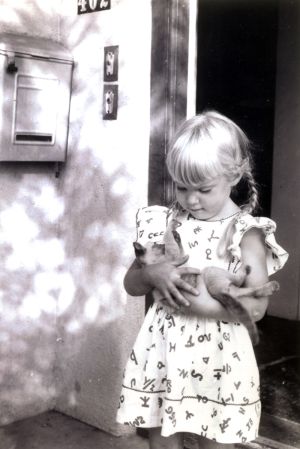
Photo courtesy of Marilyn Cosho
Marilyn Cosho at age 4 with a family cat. The Coshos had a constant supply of pets during Marilyn’s childhood. Marilyn felt a special bond with them, as do many people with Asperger’s syndrome
So you think it is difficult to keep a routine?
Reducing choices to keep everything serene.
Do you try to make life simple to avoid the fuss?
If you have Asperger’s syndrome, sameness is a must.
It’s extremely hard to never change.
To maintain your day in a narrow range.
No husband, no children, no distractions per se.
You may wonder why this person is so tired every day.
Any abrupt change, I become unnerved,
If I forget to buy peanut butter, dinner’s obscured.
This relates to another difficulty I apprehend.
It’s in finding a different way to solve a problem.
And what of the virtue of keeping on task?
To finish the job, down to the last?
I am drawn to details, like a moth to a flame,
Intense concentration comes naturally, stopping is the strain.
Do you have an idea so you just jot it down?
I’ve spent 15 hours going round and around.
Doing my special interests fascinates my mind,
I become so entranced, I lose all track of time.
The imagination takes over, similar to hypnosis.
No wonder it can be mistaken for mania or psychosis.
Joy and happiness are worth the price,
But feeling there’s not enough time isn’t so nice.
The reason a special interest can be so alluring,
Is that intense concentration is a refuge from all that’s disturbing.
It’s as exciting as Carter’s first glimpse into Tut’s tomb
Or Armstrong’s first stepping out onto the moon.
Einstein and Glenn Gould seemed awkward in day-to-day living,
It was their quest for beauty and order that was all-consuming.
Cleaning or sorting, finding the best whatever,
It might be repeating a seemingly worthless endeavor.
I once spent three hours without any fret,
Picking off tiny dead blossoms from a pot of baby’s breath.
Being with people is a huge drain.
Solitude the only way to find calmness again.
The ratio is about 2:2, experience has shown.
Two hours with people, then at least two alone.
An unexpected call will set me back.
Staying up late will be simply that.
Talking is exhausting, e-mails are better.
I don’t care about clothes, I like my old sweater.
If you’re a doctor or therapist and graduated pre-’94,and your adult patient has symptoms that cover the floor.
And your patient is intelligent but underachieves,
Don’t overlook Asperger’s or you may be deceived.
One-on-one they can speak with some ease,
Being somewhat uncertain, they will try hard to please.
But these older adults have learned to act,
Underneath this fragile veneer, they may not feel intact.
Don’t tell them they’re smart and need to trust their instincts,
That’s precisely their problem, they’re needier than you think.
Honest and loyal, not wanting to be cruel,
Yet I’m often misunderstood and feel childish as a rule.
Underemployed, divorced, and undiagnosed, I was a wreck,
A college degree, conscientious; without much self-respect.
It is hard for people to grasp the Asperger anomaly,
A disguised disability that can create such despondency.
Memory for some things but getting lost following directions,
Sensitive to touch, light and reflections.
Can mix paint perfectly, can hear a gnat,
Who finds value in skills like that?
Animals can fill the need for intimacy,
I wish I could hold a cow or pet a baby wallaby.
The older I get the more aware of my needs I become,
The more deliberately I search to seek out what’s fun.
It’s a marvel to me that kids now can be diagnosed at age three.
I was 54 when I finally found me.
The diagnosis was a life-changing event.
The puzzle is solved, I’m the way I was meant.
So if you ever meet someone you know has Asperger’s,
Please look past their eccentricities, for you may find hidden treasures.
Sept. 1, 2007.
Dedicated to my counselor Sara Hill, a licensed clinical social worker.
[_/su_spoiler] [_su_spoiler title=”Me in – American Miniaturist – –How to | Fit for a Fairy”]

Her fairy twig chairs are extremely delicate, intricate — and beautiful. Photo by Brad Talbutt / Idaho Statesman
Spoiler content [_/su_spoiler]
[_su_spoiler title=”Spoiler title”] Spoiler content [_/su_spoiler] [/su_accordion]
What the Heck is Asperger’s? -A Poem by Marilyn Cosho
My Story | Unraveling A Mystery
